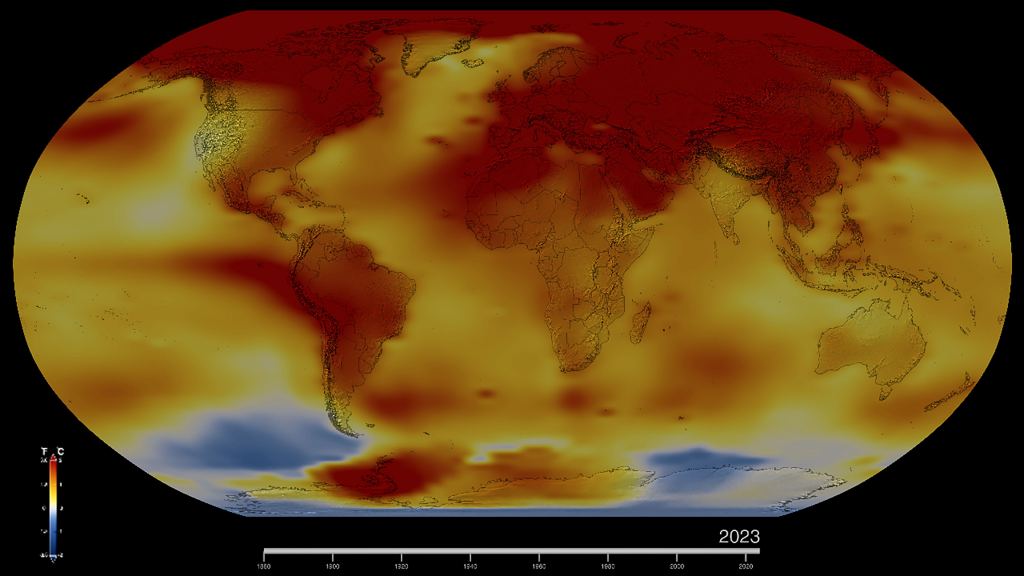After analyzing the temperature data from 2023, NASA has concluded that it was the hottest year on record. This will surprise almost nobody. If you live in one of the regions stricken by drought, forest fires, or unusually powerful weather, you don’t need NASA to confirm that the planet is warming.
NASA’s Goddard Institute for Space Studies produced the analysis that led to this conclusion. They looked at temperature anomalies rather than strictly at temperatures. Temperature anomalies show how much hotter or colder than normal it is at a specific place and time.
In this case, normal means the average over a 30-year period between 1951 and 1980 for a time and place. The analysis, which makes use of extensive satellite data, showed that 2023 was the hottest year on record. In fact, every month from June to December 2023 was the hottest month compared to the same months in previous years.
Not only that, but July was the hottest month ever recorded. How much hotter was 2023? “Global temperatures in 2023 were around 2 degrees Fahrenheit (1. 1 degrees Celsius) above the average for NASA’s baseline period (1951-1980),” NASA’s Goddard Institute for Space Studies (GISS) said.
Anyone who follows news from around the world knows the world is facing more severe weather. In the USA, a mega-drought meant that parts of the Southwest suffered from a water shortage. Reservoirs were reduced to historically low levels.
In Canada, massive, numerous, and stubborn forest fires dominated the summer, with smoke moving south and enshrouding some of America’s largest cities for days. Many of those fires are still burning as zombie fires that will spring back to life after this winter. In Asia, a record-breaking heat wave struck India, China, Vietnam, and other countries.
In India, major cities exceeded 45 Celsius, schools and other places were shutdown, and rolling blackouts, triggered by air conditioner use, made things even worse. In the desert kingdom of Saudi Arabia, the temperatures reached 49 C in some places. In Europe, the Cerberus Heatwave brought temperatures above 40 C to many countries, including Spain, where temperatures reached 45 C.
Hundreds of millions of us faced extreme temperatures during the summer of 2023. Millions of us watched helplessly as forest fire smoke clouded our skies and damaged our lungs. Farmers struggled, and food prices rose.
But climate change isn’t just about heat, smoke, and fire. It’s also about extreme rainfall, flooding, and hurricanes. Whatever the consequences, it’s not something humanity has seen before.
“The exceptional warming that we’re experiencing is not something we’ve seen before as a species,” said Gavin Schmidt, director of GISS. “It’s driven primarily by our fossil fuel emissions, and we’re seeing the impacts in heat waves, intense rainfall, and coastal flooding. ” Most of what the Earth is going through is due to human-caused climate change.
But other things still contribute to the climate, like El Nino and El Nina. Climate scientists consider all these things when trying to understand what’s happening. But we have no control over El Nino.
Our carbon emissions are the only thing we have control over. Vegetation and the oceans only absorb about 50% of our emissions, and the rest persists in the atmosphere. It’s not just Earth’s atmosphere that warms.
Our oceans absorb most of the heat trapped by greenhouse gases, about 90% of it. The oceans are a gigantic heat sink, and they’ll continue to warm as the atmosphere does. That changes the biochemistry and the overall health of the oceans and also accelerates the melting of our major ice sheets.
“Just like global temperatures, ocean temperatures are on the rise,” said Josh Willis, a climate scientist at NASA’s Jet Propulsion Laboratory. “They have been rising for the last century or more, and they are not slowing down. If anything, they are speeding up.
” The world will keep warming for the next several decades or more, no matter what changes we make today. But the future is still in play. Scientists still need as much detailed climate data as we can gather, even though we know we’re responsible for the warming world.
We can still prepare for the worst of it while developing and implementing solutions. “We are very interested in the weather and extremes of any particular year because those are the things that impact us,” said GISS Director Schmidt. “But the key difference between this decade and the ones before is that the temperatures keep rising because of our activities, principally the burning of fossil fuels.
” NASA’s results show the future we face. More heatwaves, more devastating forest fires, more pressure on agriculture and food prices, and a bleak future for some of the world’s poorest people. But it’s not foreordained.
There are solutions, and they’re being implemented. Renewable energy use is on the rise, for example, and people around the world are demanding that governments implement more changes. And while arcane scientific arguments about atmospheric chemistry and physics are not that impactful for many people, extreme heat is a much more effective alarm bell.
So are the things that extreme heat brings, like flooding, fire, smoke, heat waves, rising sea levels, and higher food prices. Let’s hope the next generations and the politicians that accompany them don’t keep pressing the snooze button like we have. .
From: universetoday
URL: https://www.universetoday.com/165273/nasa-confirms-that-2023-was-the-hottest-year-on-record/



